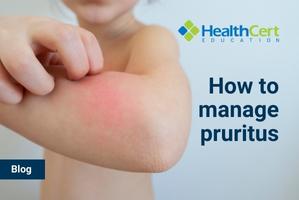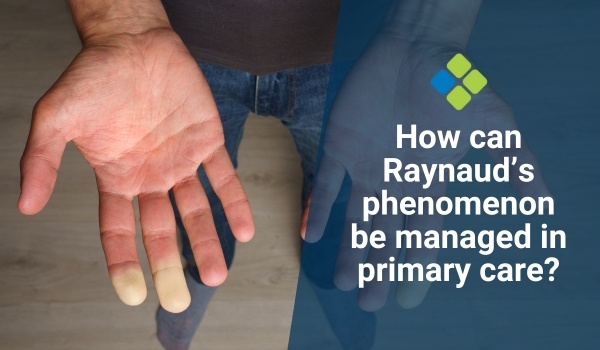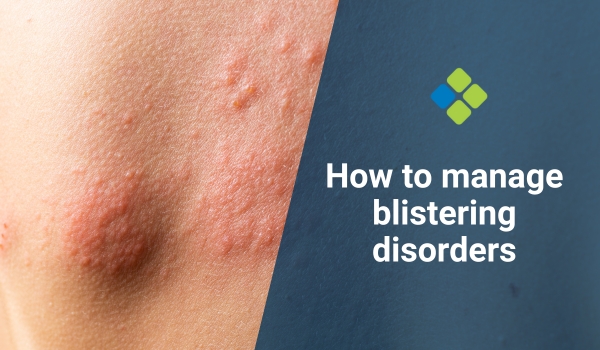How to manage pruritus
Pruritus, or itching, is a skin symptom that can impact quality of life. Learn more about investigations and treatments for pruritus.

HealthCert Education
As a primary care physician, managing a variety of skin conditions is an important part of your practice. Pruritus, or itching, is a common symptom that patients may present with, and it can have a significant impact on their quality of life. While some cases of pruritus may be straightforward to manage, others may require a more in-depth evaluation and treatment plan.
For further information on this topic, you may be interested to learn more about the HealthCert Professional Diploma program in General Dermatology.
It's essential to have a solid foundation in the management of pruritus. In this article, we'll review some guidelines for managing pruritus in primary care.
Assess the severity and duration of pruritus
The first step in managing pruritus is to assess the severity and duration of the patient's symptoms. It's essential to determine whether the itching is mild, moderate, or severe, as this will guide your treatment plan. You should also ask about the duration of symptoms, as chronic pruritus may require a more comprehensive evaluation.
Identify underlying causes
Next, it's essential to identify any underlying causes of pruritus. Many conditions can cause itching, including skin diseases, systemic diseases, medications, and psychological factors. A thorough history and physical examination can help you identify the cause of pruritus in many cases. In some cases, laboratory testing or referral to a dermatologist or other experts may be necessary.
Treat underlying causes
If an underlying cause of pruritus is identified, it's essential to treat it. For example, if a patient has pruritus due to atopic dermatitis, treatment with topical steroids or calcineurin inhibitors may be effective. If pruritus is due to a systemic disease such as kidney disease or liver disease, treating the underlying condition may alleviate symptoms.
Treatment options for pruritus
Topical therapies
In many cases, topical therapies can be effective in managing pruritus. Emollients and moisturisers can help soothe and hydrate dry, itchy skin. Topical corticosteroids can be used to reduce inflammation and relieve itching. Topical calcineurin inhibitors, such as tacrolimus and pimecrolimus, can also be effective in managing pruritus in some cases.
Oral therapies
In more severe cases of pruritus, oral therapies may be necessary. Antihistamines such as diphenhydramine and hydroxyzine effectively reduce itching, although they may cause drowsiness. Gabapentin and pregabalin can also help with pruritus management (when neuropathic pain is present).
Lifestyle modifications
Finally, lifestyle modifications can be effective in managing pruritus. Patients should avoid hot water and harsh soaps, which can dry out the skin and exacerbate itching. Wearing loose-fitting clothing made from natural fibers can also help reduce irritation. In some cases, stress reduction techniques such as meditation or yoga may help manage pruritus.
The Bottom Line
Managing pruritus in primary care requires a thorough assessment of the severity and duration of symptoms, identification of underlying causes, and appropriate treatment. Topical and oral therapies, as well as lifestyle modifications, can be effective in managing pruritus.
If you're interested in pursuing a special interest in general dermatology, having basic experience in the management of pruritus is essential to providing high-quality care to your patients.
– Dr Rosmy De Barros
References:
- Chung BY, Um JY, Kim JC, Kang SY, Park CW, Kim HO. Pathophysiology and Treatment of Pruritus in Elderly. Int J Mol Sci. 2020;22(1):174. Published 2020 Dec 26. doi:10.3390/ijms22010174
- Combs SA, Teixeira JP, Germain MJ. Pruritus in Kidney Disease. Semin Nephrol. 2015;35(4):383-391. doi:10.1016/j.semnephrol.2015.06.009
- Nowak DA, Yeung J. Diagnosis and treatment of pruritus [published correction appears in Can Fam Physician. 2018 Feb;64(2):92]. Can Fam Physician. 2017;63(12):918-924.
- Song J, Xian D, Yang L, Xiong X, Lai R, Zhong J. Pruritus: Progress toward Pathogenesis and Treatment. Biomed Res Int. 2018;2018:9625936. Published 2018 Apr 11. doi:10.1155/2018/9625936

 1800 867 1390
1800 867 1390





